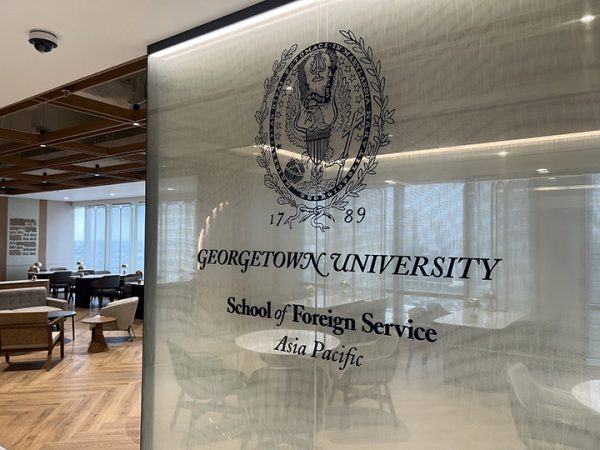The Georgetown University School of Foreign Service (SFS) launched an academic location in Jakarta serving mid-career professionals in the Asia-Pacific region and main campus graduate students.
Georgetown SFS Asia-Pacific (GSAP), which enrolled its first students this January, currently hosts an executive master’s in diplomacy and international affairs (EMDIA) program for regional international affairs professionals and an Asia-Pacific policy research program for visiting graduate students based at the Washington, D.C. campus. The launch follows former Indonesian president Joko Widodo’s announcement of plans to collaborate with the university in a Nov. 13, 2023 speech in Gaston Hall.

Yuhki Tajima, GSAP’s program director, said the program aims to address the needs of the Global South while serving its surrounding community.
“ Everything that we do is about the Global South and the Asia-Pacific, and it complements what we have on the main campus,” Tajima told The Hoya. “The main campus is really good at navigating the halls of Washington, but the blind spot on that is we probably think too much like Washington. Over the years, I’ve noticed that the issues that are affecting the Global South are very abstract for our students.”
To integrate knowledge about the Global South and western policy, GSAP students study across Georgetown’s campuses. The EMDIA program, which currently enrolls 26 students, includes a semester in Jakarta, a week at Georgetown’s campus in Doha, Qatar and a semester at Georgetown’s D.C. campus.
Amanda Rahman (GRD ’25), who enrolled in the EMDIA program while working at Indonesia’s Ministry of Foreign Affairs, said she values the diversity of perspective fostered by the program’s format.
“I believe that it is important to have diversity in perspective as it will provide us with better insights in formulating policies,” Rahman wrote to The Hoya. “As a person coming from the Southeast Asian region, I highly value the divergence of information and knowledge that are not biased from an Asian-centric or Western-centric point of view.”
The policy lab program similarly seeks to connect D.C.-based graduate students with a deeper understanding of issues that affect the Global South, integrating perspectives from local leaders and communities. The first policy lab offerings engage approximately 10 students in research exploring the environmental effects of critical mineral mining and Indonesia’s biodiversity.
Brandon Wu (SFS ’24, GRD ’25), a graduate student pursuing a master’s degree in Asian studies who enrolled in the inaugural environmental policy lab, said the immersive, hands-on research opportunities drew him to the program.
“It’s virtually unheard of to go abroad in a master’s program and take part in research opportunities like this, getting real field work experience and learning about issues from the perspective of the Global South,” Wu told The Hoya. “We’re getting to hear from faculty who are based out of Indonesia and really cool guest speakers. I think that has been an experience that you can’t really get on Zoom in D.C.”
Scott Guggenheim, the director of the policy labs and a professor of global human development, said he hopes GSAP will allow students to center the Global South in their research.
“We’re coming up with research and a platform where people meet and think about how not to be quite so dominated by a first-world type of thinking, the grand strategy that divides the world into America, Russia and China,” Guggenheim told The Hoya. “We’re focusing a lot more on what the Global South would be thinking about, partly in terms of its own development and of how they engage within a very politicized global system.”
Though Indonesia is the fourth most populous country in the world, the launch of GSAP makes Georgetown the first U.S. university to operate in the nation.
Diah Ayu Maharani, education attache at the Embassy of the Republic of Indonesia in the United States, said the launch of Georgetown programs in Indonesia will contribute to Indonesia’s goal of increasing its collaborations with universities abroad.
“The opening of a Georgetown University campus in Jakarta significantly contributes to Indonesia’s education development goals by enhancing the quality of education, expanding access to international programs and fostering innovation,” Maharani wrote to The Hoya. “The university’s focus on research and innovation addresses critical local challenges such as climate change, public health and urban development while promoting collaboration with Indonesian universities, government agencies and industries.”
Maharani said the opening of GSAP connects to Indonesia’s long-term goals for education and social development by educating leaders in diplomacy.
“This partnership not only aligns with Indonesia’s higher education reform efforts but also reinforces the nation’s aspirations to become a key player in the global knowledge economy,” Maharani wrote. “In the long term, the Georgetown campus in Jakarta will serve as a catalyst for Indonesia’s broader development goals, nurturing a generation of globally competent and locally rooted leaders who can drive sustainable growth and innovation.”
Wu said he is looking forward to watching the program grow, even after his graduation.
“Getting to be a part of something new obviously poses some challenges — there are some kinks still being worked out,” Wu said. “We’ve got some graduate students in the SFS who are coming at the end of the spring semester and getting to pass along some institutional knowledge. Having some things more developed for folks down the line is something that I would be happy to contribute towards.”







